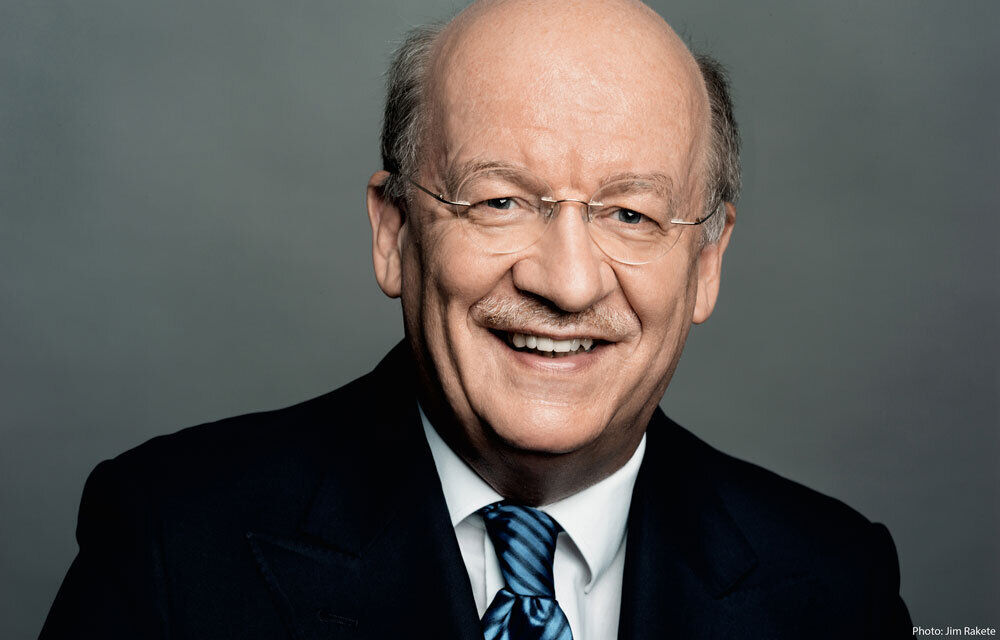Professor Wolfgang Wahlster receives honorary doctorate from the University of Oldenburg

AI expert Prof. Dr. Dr. h.c. mult. Wolfgang Wahlster. Photo: Jim Rakete
A press release from the German Research Center for Artificial Intelligence (DFKI)
Prof. Dr. Dr. h.c. mult. Wolfgang Wahlster, expert in artificial intelligence, Chairman of the Board of Management for over 20 years and currently Chief Advisor to the German Research Center for Artificial Intelligence (DFKI), has been awarded an honorary doctorate by the Faculty II Computer Science, Economics and Law at the University of Oldenburg.
Wahlster, a graduate of the Max Planck Gymnasium in Delmenhorst, studied computer science and theoretical linguistics at the University of Hamburg, where he also earned his doctorate in 1981. At Saarland University, he taught and conducted research as a professor of computer science from 1982 to 2018, and his chair was successful with two Collaborative Research Centers and a Cluster of Excellence of the German Research Foundation. The focus of his work was in the areas of artificial intelligence (AI) and computational linguistics, and he was particularly engaged in topics such as user modeling, human-machine communication, and cognitive assistance systems. As founding director of DFKI and later as technical and scientific director as well as chairman of the management board, the computer scientist expanded DFKI from 1988 to 2019 to become the world’s largest research institution in this field. Together with Prof. Dr. Henning Kagermann and Prof. Dr. Wolf-Dieter Lukas – both guests at the ceremony – he coined the “Industry 4.0” concept for the comprehensive digitization and automation of industrial production. In 2011, they published the first paper. In the meantime, Industry 4.0 has become a German export hit, Kagermann and Lukas emphasized in their speeches.
Wahlster has had a significant impact on AI research over the past 45 years. “Professor Wahlster is undoubtedly one of the world’s most renowned AI researchers in this field, with a very considerable number of high-profile international publications,” said Lower Saxony’s Minister of Science Björn Thümler at the award ceremony in the Oldenburg State Theater. “In establishing the DFKI Laboratory Lower Saxony in Osnabrück and Oldenburg, he has skillfully leveraged the potential of our state in the research field of artificial intelligence in the interest of both parties and greatly spurred its development by setting ambitious goals.”
University President Prof. Dr. Ralph Bruder emphasizes: “I have known and appreciated Wolfgang Wahlster’s foresight and his expert advice for many years. For the university, he has been a reliable and important companion who, with a great deal of personal commitment, has continued to work hard for Oldenburg’s computer science to this day.” In Wahlster’s honor and in recognition of his scientific achievements, the university had held a celebratory colloquium in the morning with high-profile speakers.
Through his commitment, Wolfgang Wahlster “has contributed significantly to the development of Oldenburg’s computer science to its current size with 24 professorships, 1,500 students and the non-university research institutions DLR, DFKI and OFFIS,” quotes Prof. Dr. Rudolf Schröder, Dean of Faculty II at the University of Oldenburg, from the report of the honorary commission.
As early as the early 1980s, Wahlster was a member of a commission that developed the concept for the “Applied Computer Science” degree program at the University of Oldenburg. Since then, he has supported Oldenburg’s computer science with dedication over a period of almost 40 years, the honorary commission emphasized.
Prof. Dr. Sebastian Lehnhoff, Chairman of the Board of OFFIS, also expresses his gratitude. “Wahlster has been closely associated with the OFFIS computer science institute – the first affiliated institute of the University of Oldenburg – since its foundation in 1991. He has been a member of our institute’s Scientific Advisory Board from its first meeting in 1992, with interruptions, until today and has served as the board’s spokesperson for a long time.”
Wahlster has been honored with high awards for his work at both national and international level. Among other things, he is the recipient of the German Future Prize and in 2013 received the Donald E. Walker Distinguished Service Award from the World Association for Artificial Intelligence (IJCAI). In 2019, the Federal President of Germany awarded him the Federal Cross of Merit. Wahlster holds honorary doctorates from the universities of Linköping (Sweden), Darmstadt, Maastricht (Netherlands), and the Technical University of Prague (Czech Republic), and is a member of the Royal Swedish Academy of Sciences, the Leopoldina National Academy of Sciences, the Academy of Sciences and Literature (AdW Mainz), the Berlin-Brandenburg Academy of Sciences, and the Academy of Science and Engineering (acatech).
/PZS
Background Saarland Informatics Campus:
900 scientists (including 400 PhD students) and about 2100 students from more than 80 nations make the Saarland Informatics Campus (SIC) one of the leading locations for computer science in Germany and Europe. Five world-renowned research institutes, namely the German Research Center for Artificial Intelligence (DFKI), the Max Planck Institute for Informatics, the Max Planck Institute for Software Systems, the Center for Bioinformatics and the Cluster for “Multimodal Computing and Interaction” as well as Saarland University with three departments and 24 degree programs cover the entire spectrum of computer science.
Die Öffentlichkeitsarbeit am Saarland Informatics Campus wird unterstützt durch das Kompetenzzentrum Informatik Saarland, gefördert aus Mitteln des Europäischen Fonds für regionale Entwicklung (EFRE) und Mitteln der Staatskanzlei Saarland.


